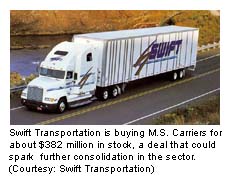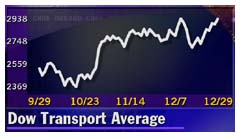|
Transport earnings at risk
|
 |
December 29, 2000: 11:51 a.m. ET
Slowing economy, mergers, labor could hit profitability despite drop in fuel prices
By Staff Writer Chris Isidore
|
NEW YORK (CNNfn) - Fuel prices are coming down. The Federal Reserve is poised to lower interest rates. This should be a good time for transport stocks.
But recent earnings warnings and concerns about the slowing economy have some analysts cautioning about jumping into the sector right now. The slowing economy could put the brakes on earnings far harder than the high prices or interest rates have been able to do for the last year.
"It's the economy, not fuel, that's most important," said Jim Higgins, transportation analyst for Credit Suisse First Boston.
The latest warning came Wednesday night when Union Pacific Corp. (UNP: Research, Estimates), owner of the nation's largest railroad as well as a major trucking company, warned that the slowing economy would derail its earnings outlook.
 "The downward trend in the economy has accelerated sharply in the past few weeks," said a statement from Dick Davidson, CEO of the Union Pacific Railroad. "The railroad's fourth quarter carloadings are expected to rise by only one percent over a year ago, considerably below our forecast. An increasing number of our customers report that their business levels have weakened, and few see any signs of significant improvement." "The downward trend in the economy has accelerated sharply in the past few weeks," said a statement from Dick Davidson, CEO of the Union Pacific Railroad. "The railroad's fourth quarter carloadings are expected to rise by only one percent over a year ago, considerably below our forecast. An increasing number of our customers report that their business levels have weakened, and few see any signs of significant improvement."
But the warning is just the latest to hit the sector. Trucking and air cargo companies like United Parcel Inc. (UPS: Research, Estimates), FedEx Corp. (FDX: Research, Estimates) and CNF Inc. (CNF: Research, Estimates) have all warned in recent weeks, as has another major rail carrier, Norfolk Southern Corp. (NSC: Research, Estimates).
It's not just freight that will be dropping off in a slowing economy. Analysts have also been cutting earnings estimates for the fourth quarter and 2001 at the major airlines. In addition, Carnival Corp. (CCL: Research, Estimates), the world's largest cruise operator, warned last week that its earnings in 2001 would be below forecasts, and this week Commodore Holdings Ltd. (CCLN: Research, Estimates) became the second major cruise line during 2000 to file for bankruptcy court protection.
Weak economy not only risk for sector
Added to the uncertainty caused by the economy is concern about industry-specific factors that could play out this year. Labor unrest could hit the four largest airlines, and the proposed deal by United Airlines' parent UAL Corp. to buy US Airways Group, if approved, could again stir up talks of deals by other major carriers.
But Higgins said at this point airline passenger bookings and fares have not shown a decline, though that could change quickly since most tickets are purchased within 30 days of the flight. And most of the major carriers are likely to be helped by continued service problems and defection of business customers at United, the world's largest carrier, which along with declining fuel costs, should help cushion any drop in profit.
 The election of Republican George Bush as president should help shift some of the balance of power at labor negotiations between airlines at their unions, since the president has broad power to order airline employees back to work within minutes of the start of a strike. The election of Republican George Bush as president should help shift some of the balance of power at labor negotiations between airlines at their unions, since the president has broad power to order airline employees back to work within minutes of the start of a strike.
"The climate in terms of labor getting away with stuff they've gotten away with the last eight years is not as good," said Higgins. "Bush doesn't owe anything to labor. There's a subtle but important shift in power back towards the company."
Still, even the threat of a strike can be costly to the airlines, and efforts by mechanics to ground planes at United and Northwest Airlines recently and the refusal of pilots at Delta Air Lines to fly on overtime show that the unions still have great clout. Higgins said that United's lucrative new contract with pilots will prove a costly precedent for the industry in 2001.
"Compensation costs are going up. United has seen to that," said Higgins.
Railroad earnings expected to derail
The rail industry stocks could also be hit by a round of consolidation there as a 15-month moratorium on mergers there imposed by U.S. regulators is set to expire in June, although it's not clear that U.S. regulators will complete their work on new merger rules by that deadline if there is a change, as expected, in leadership of the Surface Transportation Board which oversees rail deals. Depending on the state of the rules there could either be a rush to announce deals early this summer to take effect of old, merger-friendly guidelines, or a delay by railroads waiting to see what concessions they'll have to make to win approval of acquisitions, said Jim Valentine, rail analyst for Morgan Stanley Dean Witter.
"My crystal ball is fairly murky right now," he said.
The proposed deal that prompted the merger moratorium was the combination of Burlington Northern Santa Fe Corp. and Canadian National Railway, which would have formed North America's largest railroad, and given a Western U.S. railroad access to the East Coast for the first time.
But just because BNSF is based in Bush's home state of Texas doesn't mean it will have much influence with the new administration. The opposition to the deal was led by Union Pacific, which had Vice President-elect Dick Cheney as a board member, and has strong ties to former Transportation Secretary Andrew Card, who will be Bush's chief of staff.
Trucking merger seen down the road
Trucking, which has seen a couple of major publicly-held carriers during 2000, could see more consolidation, especially if a downturn in profitability puts some carriers under pressure.
"I think it's going to be a year of consolidation for trucking, either via acquisition or bankruptcy," predicts Doug Rockel, analyst with ING Barings.
So far the major deals announced were of relatively healthy companies -- FedEx Corp. announced a $950 million deal to buy American Freightways Corp. (AFWY: Research, Estimates), a company that handles pallet-sized shipments of freights from multiple customers on the same truck, sorting them through a series of terminals. That's a sector of trucking known as less-than-truckload or LTL.
The other major trucking sector which handles trailer-size shipments directly from origin to destination without warehouses is known as truckload. It has been more battered by fuel prices than the LTL sector, but also could see more excess capacity if there is a slowdown in the economy.
 So far the only major deal there is between two relatively healthy carriers. Swift Transportation Co. (SWFT: Research, Estimates) announced plans Dec. 11 to buy M.S. Carriers Inc. (MSCA: Research, Estimates) for about $382 million in stock, which was a 52 percent premium. The deal would form the nation's third-largest truckload carrier. So far the only major deal there is between two relatively healthy carriers. Swift Transportation Co. (SWFT: Research, Estimates) announced plans Dec. 11 to buy M.S. Carriers Inc. (MSCA: Research, Estimates) for about $382 million in stock, which was a 52 percent premium. The deal would form the nation's third-largest truckload carrier.
While investors appear to be relatively optimistic about these two deals, the history of major trucking mergers has usually been one of service problems, lost customers and financial problems for the combined companies.
Stocks have seen recent gains
Still, transport stocks have staged a nice rally the last three months, as the Dow transportation index rose 24 percent between mid-October to mid-December before slipping slightly. That significantly outperformed other major market indexes during the same period. At least one analyst says that even with the coming profit squeeze, this is not a bad time to look at some transport stocks.
 "I like where we are in the cycle," said Ed Wolfe, analyst with Bear Stearns, speaking about trucking and other freight handler's stocks. "You don't buy them when things are good. You buy them when things are bad, in front of Fed easing and fuel coming down, that's when you buy them." "I like where we are in the cycle," said Ed Wolfe, analyst with Bear Stearns, speaking about trucking and other freight handler's stocks. "You don't buy them when things are good. You buy them when things are bad, in front of Fed easing and fuel coming down, that's when you buy them."
Still others said they worry about the prospect for many of the transport stocks going forward, especially if the economy, freight shipments and airline passenger bookings slow down.
"The stocks have outperformed the market substantially over the last six weeks as people tried to get positioned for a Fed easing in January by buying cyclical stocks," said Valentine. "It'll be tough for the group to go up much further from here until we get clarity what's going on with economy."
Valentine said that he's already lowered UP's earnings estimates for 2001, even though that wasn't covered in the company's recent warning. He said he thinks railroads as a group are poised for a prolonged period of disappointing revenue and earnings.
"I think it's going to be tough for railroads that haven't pre-announced to hit their fourth-quarter estimates, and this is supposed to be the strong quarter," he said. "If they're having these problems now, what's that say about the next two quarters?" 
|
|
|
|
|
 |

|

